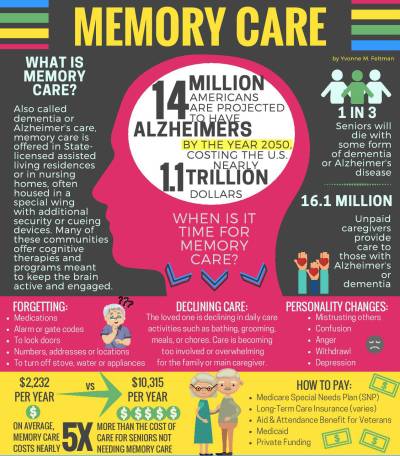Why Personalized Memory Care is Essential for Dementia Care
Why Personalized Memory Care is Essential for Dementia Care
Blog Article
All Regarding Memory Care Services: Why Little Memory Treatment Residences Are an Excellent Selection
Memory treatment solutions play an essential function in supporting individuals with Alzheimer's and dementia. Tiny memory treatment homes attract attention for their tailored method and intimate setting. With lower staff-to-resident proportions, these homes foster more powerful links and tailored care. Residents profit from improved social interactions and a secure environment. As family members discover choices, understanding the one-of-a-kind benefits of tiny memory care homes becomes essential. What elements should be thought about when choosing the appropriate home?
Comprehending Memory Treatment Solutions
While many might be familiar with basic elderly care alternatives, recognizing memory care solutions is necessary for households encountering the challenges of cognitive decrease. Memory care especially provides to individuals with conditions such as Alzheimer's disease and other types of dementia. These solutions supply an organized environment that concentrates on boosting the lifestyle for citizens with specialized treatment and support.Memory care centers are made to assure safety and security and safety, commonly including secured environments to prevent wandering. Trained team member are offered all the time to assist with everyday tasks, medication administration, and personal treatment. In addition, memory treatment programs usually include cognitive excitement tasks, customized to engage citizens and advertise psychological well-being. Family members can gain from understanding these services, as they allow educated choices regarding their loved ones' treatment, making certain that their particular requirements and choices are resolved in a encouraging and thoughtful manner.
The Benefits of Small Memory Treatment Residences
Tiny memory treatment homes use distinctive advantages that can substantially enhance the quality of life for locals with cognitive disabilities. One substantial advantage is the intimate atmosphere, which enables for tailored interactions among team and citizens. This smaller setup cultivates significant connections, lowering sensations of seclusion and stress and anxiety often experienced by individuals with memory issues.Additionally, the lower staff-to-resident ratio in tiny memory treatment homes allows caregivers to supply more mindful guidance and assistance. This strategy not just improves safety but also promotes a complacency for the residents.Moreover, small memory care homes can adjust promptly to the distinct needs and choices of each homeowner, enabling a more homey environment. Such an atmosphere can encourage social involvement and involvement in activities, inevitably enriching the day-to-day experiences of those dealing with cognitive impairments.
Personalized Treatment Plans for Citizens
Customized treatment strategies are essential in memory care homes, as they accommodate the one-of-a-kind needs and preferences of each citizen. These plans begin with complete analyses carried out by competent specialists, who assess cognitive abilities, medical background, and personal rate of interests. This customized strategy warranties that care is not only efficient but likewise respectful of each individual's self-respect and autonomy.Moreover, customized treatment plans are versatile, permitting adjustments as homeowners' demands progress with time. This flexibility promotes a complacency and experience, which is crucial for individuals living with memory difficulties. Caretakers are educated to apply these plans regularly, supplying assistance that straightens with the citizens' routines and preferences.Ultimately, individualized care plans boost the top quality of life for homeowners by advertising engagement, wellness, and self-reliance, making them a fundamental aspect of memory treatment solutions in tiny memory treatment homes.
Producing a Home-Like Environment
Developing a home-like setting is important for promoting comfort and knowledge in memory care setups, as it significantly impacts homeowners' emotional health. Little memory treatment homes usually focus on individualized touches, such as warm shade combinations, household images, and acquainted furniture setups, which assist citizens feel more secure. Integrating components evocative a standard home, like comfortable home and communal areas, urges a sense of belonging.Moreover, using all-natural light and outside areas can enhance the atmosphere, advertising relaxation and serenity. Personnel members play a significant function in maintaining this atmosphere by involving with citizens in a compassionate manner, treating them like household. Regular tasks, such as cooking or horticulture, can additionally add to a home-like feeling, providing chances for homeowners to take part in significant experiences. Generally, developing a nurturing setting supports cognitive feature and psychological stability, making it a vital element of memory treatment solutions.
Enhanced Social Interaction and Community
Improved social communication and neighborhood are essential components of memory care services. By fostering individualized social engagement and producing a family-like ambience, these solutions advertise purposeful connections among citizens. Team tasks and occasions even more encourage involvement, assisting people really feel extra consisted of and sustained.
Individualized Social Involvement
While social communication is necessary for general company website wellness, several people with memory problems commonly struggle to engage meaningfully with others. Personalized social engagement in memory treatment homes addresses this difficulty by developing customized tasks that cater to locals' one-of-a-kind passions and capacities. By focusing on individual choices, caregivers can foster links that resonate deeply with everyone. Activities such as art treatment, music sessions, and directed discussions advertise cognitive excitement and psychological expression. Furthermore, small group settings motivate camaraderie and enable even more intimate interactions, boosting sensations of belonging. This approach not only deals with feelings of isolation but additionally equips residents to keep a feeling of identity, ultimately adding to enhanced mental health and wellness and high quality of life.
Family-like Environment
In a memory care setting, cultivating a family-like environment significantly enhances social interaction and builds a feeling of neighborhood amongst locals. Smaller memory treatment homes usually prioritize intimate environments, permitting locals to create closer connections with each other and staff members. This nurturing environment promotes trust fund, which is vital for individuals with memory disabilities. Residents are most likely to talk and share experiences, developing a supportive network that eases feelings of loneliness. The knowledge of shared areas and regimens adds to a feeling of belonging, further motivating social communication (personalized memory care). In such settings, emotional bonds grow, bring about improved overall health and a greater quality of life for locals as they navigate their everyday experiences with each other
Group Activities and Events

Safety And Security and Protection Attributes in Tiny Residences
Lots of little homes developed for memory care incorporate vital security and safety features to ensure the wellness of residents. These homes often make use of safe access and leave factors to stop roaming, a typical issue amongst individuals with memory disabilities. Additionally, monitoring systems and alarm system systems enhance monitoring, ensuring that team can without delay react to any kind of unusual activities.Interior formats are tailored for safety and security, with reduced hazards such as sharp edges and clutter-free pathways. Handrails and non-slip flooring are normally set up to lower the danger of falls. Personnel members are educated in emergency situation procedures, ensuring they are prepared for different situations.Moreover, personalized treatment plans may consist of analysis of individual security needs, giving tailored options for each and every homeowner. In general, these safety and security and safety attributes produce a nurturing setting click this site where residents can thrive while preserving their self-respect and self-reliance.
How to Select the Right Memory Treatment Home
Just how can families assure they pick one of the most ideal memory care home for their loved ones? The choice needs mindful consideration of a number of aspects. Initially, households need to evaluate the facility's staff certifications and training, making certain that caretakers are experienced in taking care of memory-related conditions. Next off, it's important to examine the home's environment, concentrating on safety functions and whether it cultivates a sense of community and belonging. Checking out the center can supply insight into daily tasks and the social environment, which are important for mental excitement and psychological well-being. Furthermore, family members should ask about the care plans offered, ensuring they are tailored to specific needs. Finally, taking into consideration the home's location and accessibility for household gos to can contribute to a smoother shift. By dealing with these facets, households can make an informed choice that prioritizes their enjoyed one's convenience and lifestyle in a memory treatment setup.
Often Asked Questions
What Certifications Should Staff Members in Memory Treatment Homes Have?
Team participants in memory care homes need to possess pertinent accreditations, experience in mental deterioration care, solid interaction abilities, and empathy. Ongoing training in behavioral management and therapeutic treatments improves their ability to support residents properly.
Exactly How Do Memory Treatment Services Differ From Conventional Assisted Living?
Memory care solutions focus specifically on individuals with memory impairments, giving specialized assistance and organized environments. On the other hand, conventional assisted living supplies general support with day-to-day activities, lacking the customized method essential for those with cognitive difficulties.
What Types of Tasks Are Provided in Memory Treatment Homes?
Memory treatment homes normally provide a variety of tasks designed to involve residents. Typical alternatives include art treatment, songs sessions, cognitive video games, physical workouts, gardening, and gatherings, all focused on boosting wellness and cognitive feature.
Can Residents Bring Their Own Possessions to Memory Care Residences?
Residents can usually bring their very own items to memory care homes, enabling them to customize their space - personalized memory care. This method assists produce an acquainted environment, promoting comfort and a sense of identity for the people

Exactly How Are Family Members Included in the Care Refine?
Relative play a vital role in the care procedure, frequently joining decision-making, participating in care meetings, and giving emotional support. Their participation fosters a collective setting, enhancing the local's general well-being and lifestyle. While numerous may be familiar with general elderly treatment options, recognizing memory treatment solutions is essential for family members facing the challenges of cognitive decrease. These solutions give an organized setting that concentrates on enhancing the quality of life for citizens through specialized care and support.Memory treatment centers are designed to guarantee safety and security and security, frequently including secured environments to protect against straying. Individualized treatment plans are vital in memory care homes, as they provide to the special needs and choices of each homeowner. Team members in memory treatment homes ought to have appropriate accreditations, experience in dementia care, solid communication abilities, and compassion. Memory care solutions focus particularly on individuals with memory disabilities, providing customized support and organized environments.
Report this page